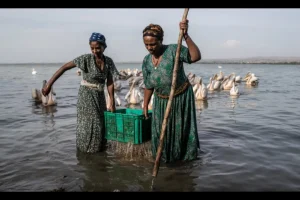
BY ABEBE WOLDEGIORGIS
The preparation of the second home grown economic reform which is expected to bring new policies and execution tools has been finalized and is waiting the consultation with the International Monetary Fund (IMF).
As to Teklewold Atnafu, the Economic Affairs Advisor of the Prime Minister Abiy Ahmed (PhD), the second home grown economic reform prioritizes accomplishing projects which were failed or delayed that must had been implemented in the first reform program. In addition, it comprises rescheduling the country’s debt repayment and to obtain additional loan from the international financial institutions. Particularly projects which were planned by the first economic reform program in which donors such as IMF and others pledged to support will be accomplished in the second program.
Currently, the second home grown economic reform program draft is submitted to the national macro-economic committee and soon it will be discussed with stake holders.
“The first home grown economic reform program is evaluated and the second one is still in its draft stage.” Teklewold said. And the new one includes new aspect of the economy and projects. For instance, it comprises the opening up of the financial sector to the foreign banks, beginning capital market and to that end legal frame work is formulated to be functional and approved by the policy makers. Their accomplishment procedures and detailed issues are explained by the second program. He further said that, the operational aspect of the foreign banks also will be comprised by the second program.
The national macro-economic committee has been discussing on the key issues of the program. The Ministers, private sector and other stakeholders will participate on the discussion. In the preparation of the first home grown economic reform program, it was intended to invite international stakeholders such as the World Bank and International Monetary Fund to participate in the discussion and contribute their part but due to the outbreak of war in the northern part of the country it was in vein.
Foreign stakeholders will also be invited in the second program. As to Teklewold, the second program indicates the direction of the nation’s economic activities in the coming four or three years and the amount of money allocated in the program also explained.
For the first home grown economic reform program accomplishment 10 billion Dollars was estimated to be allocated and it was intended to obtain most of the money from the International Monetary Fund, the World Bank and other international partners. Agreement was reached between the government and donors to secure 6 billion Dollars from the total amount. But it was unable to obtain the money due to the outbreak of war in the northern part of the country. The second reform program also considers the mobilization of money from international financial institutions and discussion will be kicked off soon.
As to Teklewold, conducting discussion with the IMF is crucial for attaining the objectives of the second round economic reform program. To open the discussion with the IMF there needs the approval of the board of directors of the IMF and it is expected to obtain the permission soon.
When the boards of directors give green light for discussion, the Ethiopian delegates will go to the IMF head office in Washington and its officials also will come to Ethiopia for discussion and securing the loan will be realized.
Teklewold further said that the delegates of the IMF will come here in this month and the Ethiopian delegates also will go there. But still the date is not decided.
“Agreement will be reached regarding the amount of money allocated to run the program which is planned to be implemented in the coming three or four years, how much money will IMF, the World Bank and other stake holders donate , how much debt will be cancelled and other issues will be comprised” Teklewold said. When the debt payment is rescheduled or cancelled, the hard currency that is going to be allocated for debt service will be saved and used for other development scheme.
Currently, Ethiopia allocated 2 billion Dollars for debt service annually and when the debt payment is rescheduled the nation can save 1 billion Dollars and within five years it can save 5 billion Dollars. But if it is not rescheduled accomplishing the second economic reform is unthinkable; because allocating 2 billion Dollars for debt payment annually cripples the nation’s endeavor in attaining to its economic development.
It is remembered that Prime Minister Abiy Ahmed recently announced that the debt burden hang over the nation’s ability to pay and his statement indicates that how debt payment is painful to the country. In addition, the refrain of donor countries to provide support to the country due to the outbreak of war in the northern part of the country further aggravated the situation. Debt payment also affects the nation’s hard currency reserving capacity.
As to Teklewold, the current foreign debt is the cumulative effect of the loan the nation obtained from foreign countries and financial institutions for the last 30 to 40 years. But what is the decisive factor is not the amount of debt but how much the nation
pays its debt annually. Currently, paying 2 billion Dollars for debt service is obligatory and when it is rescheduled the amount of annual debt repayment will be reduced. He further said that the affluent country such as the United States will take loan from other countries worth of trillion Dollars but it pays and its economy also is not affected.
As compared to other countries, the amount of the debt is negligible and it is 27 billion Dollars. Because of the drying up of donors’ countries loan and grant and the absence of debt rescheduling, the nation is forced to allocate 2 billion Dollars for debt service which in turn hampers its development endeavor. If other constraints which hamper the nation’s economic efforts were removed, paying 2 billion Dollars does not mean huge. In the absence of external pressure, Ethiopia could pay its debt on time but due to shortage of means of earning foreign currency, the situation has become challenging.
But whatever the case it may be, dialogue will be conducted with the donor countries to involve them in support of the second round home grown economic reform program. They also showed interest to provide 20 billion Dollars for reconstructing infrastructure demolished by the two year’s war lasted in the northern part of the country. The reconstruction work can be said instrumental to reinvigorate the disrupted economy.
As to him, the peace agreement between the government and TPLF also brought good opportunities to obtain hard currency from donor countries.
The government, long ago, has tried its level best to address the nation’s economic problems and to achieve better development endeavor. However, though it achieved tangible results, foreign debt it inherited from the previous regimes, the outbreak of war in the northern part of the country and COVID-19 hampered the progress. Now, as mentioned above, the peace agreement reached between the government and TPLF brought some glimpse of hope.
Looking the situation as a good opportunity, donor countries pledge to continue their support. The ending of the war also enables the government to save the money that would have been allocated for the war effort and to engage fully in development endeavor and attaining progress also will be realized.
THE ETHIOPIAN HERALD 2 FEBRUARY 2023




